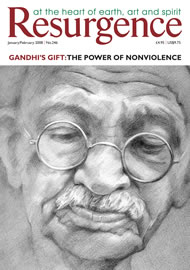THAT DISTANT LAND brings together Wendell Berry’s short stories, which constitute a remarkable, intense and surely long-lasting achievement; the collection embodies a whole philosophy of life as it recounts the imagined history of Port William, an archetypal Kentucky farming community, from the late 19th to the late 20th centuries.
The Way of Ignorance, a collection of recent essays by the same author, presents, in a naturally more explicit and didactic manner, many of the themes which dominate the fictional, or perhaps semi-fictional, stories, the principal theme in both cases being, arguably, the concept of belonging. The stories are a lament and an elegy for a largely vanished world of small farms and self-sufficient, isolated rural communities – for the agrarian origins of the USA, squeezed and marginalised there as elsewhere over the past fifty years by the spread of large-scale farming and of concrete.
It is a world characterised by its inhabitants’ connections to the land, to a particular place and to their community, by what the author calls “Membership”. The characters in the stories value and, more often than not, demonstrate the qualities of concern for their neighbours, honesty, thrift, care for the land, long-term thinking and planning over several generations, self-sufficiency and simplicity. Many of them also relish the wildness of the wooded river valleys around them, where they enjoy prolonged hunting expeditions in the spirit of the not-so-distant lives of the early European pioneers in that region.
The author is hugely respectful and affectionate towards the decent and contented community he describes and from whose factual counterpart he himself springs and, on the whole, he neither glamorises nor sentimentalises Port William; it is a completely credible, though of course selective, creation, but perhaps, in some ways, he does paint an unduly rosy picture of it. The land he writes about had, presumably, been taken by the first settlers from Native Americans, and Kentucky, although terribly divided in the Civil War, had been a state that permitted slavery and had been a part of Virginia until its admission to the Union as the fifteenth state in 1792.
More generally, the concept of membership necessarily implies exclusivity and sometimes perhaps a limited awareness of the broader world and culture as well as a strong pressure to adapt to the rules and conventions of the community. Certainly the life of Port William is shown to be one of long days filled with unremittingly hard work. On the whole, though, this world, which is so beautifully and movingly evoked, is overwhelmingly inhabited by admirable, joyful and generous-spirited people.
For example, in ‘The Solemn Boy’ we find the dignity of an itinerant father and son during the Great Depression and the simple hospitality, humanity and charity towards them of the childless and ageing Tol and Minnie Proudfoot. In ‘The Boundary’ Mat Feltner, who is old and unwell, revisits his past and remembers his son Virgil, who was killed in the Second World War, as he checks his boundary fence for the last time and collapses from illness and exhaustion during his long walk. The author touchingly describes his character’s love for the land he has known and worked all his life and through which he is connected to earlier generations of his family as well as to the memory of his lost son, who is symbolised by a broken pitcher which he left under a rock and which still remains there many years later.
Other themes which are beautifully developed in both the stories and the essays include the importance of traditional knowledge and of respecting and revering the inherent sanctity of the land, as demonstrated for example by Tol Proudfoot, to whom “it would have seemed a kind of sacrilege to rush through his work without getting the good of it” or by Wheeler Catlett, who says about an old farm, “we’re dealing in goods and services that we didn’t make, that can’t exist at all except as gifts. Everything about a place that’s different from its price is a gift.” The author also examines, in the essay that gives that collection its title, some of the destructive consequences of humankind’s arrogant ignorance, and proposes a more self-aware, more humble and more cautious approach in our dealings with the natural world, such as would flow from a recognition of the true extent of our ignorance. Meanwhile, in the latter parts of the collection, set in the 1950s and later, the older inhabitants of the farms around Port William are clearly at odds with the changing world around them, which has encroached on and begun to undermine their contented and settled community.
In one story, Sam Hanks refuses to join the Governor’s Parade, saying: “Governors don’t govern Kentucky – companies govern Kentucky.” In another, Gladston Pettit, who is not really a member of the Port William community and seems to represent the new order, has a “way of reducing things to their barest (usually monetary) essentials – his habitual reduction of principle to his own interest…”. In ‘Fidelity’ Burley Coulter is removed from hospital, where he is lying in a coma, by his son Danny Branch and, after he dies peacefully, is buried in the woods he loved and knew so well, while a hapless policeman tries unsuccessfully to find out what is going on.
Politicians and others who talk about the importance of community and sustainability might be well advised to read these essays and stories and to be reminded by them that a strong and enduring sense of community seems to thrive most readily in a cultural and economic setting that is self-contained, largely self-sufficient and slow to change and therefore sits uneasily, to say the least, within a globalised, fast-moving, highly individualistic world. Both these works contain the profound wisdom of an important and eloquent thinker, and the stories also represent a masterful and memorable work of art, which bears witness to the casting away of a valuable way of life.







